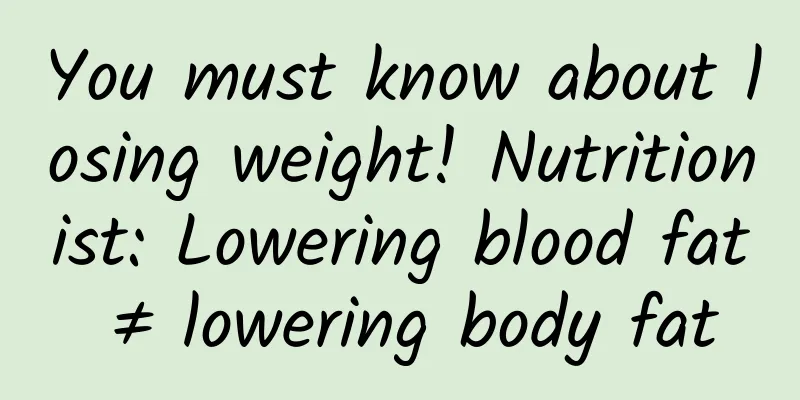You must know about losing weight! Nutritionist: Lowering blood fat ≠ lowering body fat

|
People often ask nutritionists, "Why is my body fat normal, but the blood lipid test shows high?"; or "Why is my blood lipid normal, but the measured body fat is high?"... and other similar questions. In particular, some blood lipid-lowering products on the market (including various Chinese herbs, nutritional supplements, beverages or probiotic products) have recently been fond of using words such as "fat burning", "lipid eating" or "oil cutting" to mislead consumers, making it unclear what the relationship is between "blood lipids" and "body fat". Consumers mistakenly believe that lowering blood lipids can reduce body fat, but in the end they find that their blood lipids are normal but their body fat is still high. The reason for this result is that body fat ≠ blood lipids, there is no correlation between the two. Whether blood lipids are normal or not only tells you whether you have the risk of cardiovascular disease, and has nothing to do with whether you are obese or whether your body fat is too high. Therefore, blood lipid-lowering products cannot reduce body fat. Next, Stella will introduce you to the relevant knowledge about body fat and blood lipids, so that everyone can better understand these two easily confused terms. 1. Basic concepts of blood lipids and body fat ◎Understanding "Body Fat" and "Losing Body Fat" What is body fat? Body fat is the fat stored in the body. Body fat is the body's energy storage warehouse. When energy intake is too much, these excess calories will be stored in fat cells; when energy intake is insufficient, or when there is famine, these stored energy will be used to sustain our lives (this is why people can still survive without eating for several days when they are buried under the rubble of a house during a mountain disaster or earthquake). Why does body fat become high (or increase)? Food contains nutrients such as carbohydrates, proteins, fats, vitamins and minerals (these five are called the five major nutrients). Among all nutrients, only carbohydrates, protein and fat have calories. Note: Carbohydrates mainly come from starchy foods (grains and root vegetables) and fruits; proteins mainly come from meat, fish, beans, eggs, milk and seafood; fats mainly come from cooking oils, animal skins and fat parts. When the calorie intake is too much and exceeds what the body can consume, the excess calories will be converted into fat and stored in the body. Therefore, eating too much starchy, fruit, meat, fish, beans, eggs, milk, seafood or oily food will lead to body fat accumulation. ◎Understanding "blood fat" and "lowering blood fat" What is blood fat? Commonly known as blood fat includes cholesterol and triglycerides. The cholesterol usually tested in a blood test is total cholesterol. Some tests will be more detailed and will list the amount of good cholesterol (HDL) and bad cholesterol (LDL) in the total cholesterol. Basically, it is mainly bad cholesterol that harms cardiovascular health. However, since the good cholesterol value is not easy to change, as long as the total cholesterol rises, it is mostly the bad cholesterol that rises. Therefore, many times people will only look at the total cholesterol level and directly regard high total cholesterol as high bad cholesterol, and say that high cholesterol will increase the risk of cardiovascular disease. Where do blood lipids come from? Why is the index rising? Cholesterol only comes from animal food (Note: plant foods, such as soybeans or vegetables, do not contain cholesterol); triglycerides mainly come from fat-containing foods, but excessive sugar intake will prompt the liver to synthesize more triglycerides. Basically, people who love to eat meat, especially meat with higher cholesterol content, may increase their cholesterol; while people who eat too much oil, or love to eat starchy and sugary foods, or love to drink alcohol may increase their triglyceride concentration. 2. "Blood lipids" ≠ "body fat": Understand the difference between body fat and blood lipids! 1. Blood fat refers to the fat component in the blood; body fat refers to the fat tissue in the body. The fat in food enters the body and is called blood lipids in the blood. Basically, blood lipids may "temporarily" rise due to food intake (for example, blood fat values measured after a big meal or after a lot of dinner and social gatherings recently may be high), but after a few hours, blood lipids will slowly enter cells and provide cells with energy. Therefore, when healthy people have their blood tested on an empty stomach, their blood lipids are mostly maintained within the normal standard range. After fat enters cells from the blood, if the energy exceeds what the body can consume, it will be stored in body fat warehouses, causing body fat to increase. Basically, blood lipids may have a "temporary" increase right after eating, but will generally remain within the standard range. However, body fat is a longer-term energy storage state and is less likely to experience short-term and frequent fluctuations due to diet. 2. There is no relationship between blood lipids and body fat. The body fat of a healthy person will be maintained within the normal range and will not be too high. Therefore, the level of blood lipids and body fat has nothing to do with obesity, it only represents health or not. The human body has the function of maintaining internal homeostasis, so even if a healthy person eats high-fat food, the blood fat value will return to the standard range after a period of time (this is why blood tests generally require fasting in the morning, so that the body has time to adjust it back and avoid errors that may be caused by diet). Therefore, for healthy people, low blood lipids (maintaining normal values) are normal, and blood lipids will not necessarily be high just because you are fat. Blood lipids represent health and have nothing to do with body fat or obesity. Therefore, a fat person's body fat must be high, but his blood lipids may be normal or abnormal. However, high blood lipids only mean unhealthy (this person is not only fat but also unhealthy), and normal blood lipids only mean healthy (this person is fat but has healthy blood lipids), and there is no other meaning. 3. High blood lipids are only related to high fat intake in the diet; body fat will lead to fat accumulation as long as you eat too much food containing sugar, protein, and fat nutrients (that is, starchy foods, fruits, meat, fish, beans, eggs, milk and seafood, oils, animal skins and fats, etc.). 3. Talk about "blood lipid lowering" products and "body fat lowering" products! ◎Blood lipid lowering products~ Since there is no correlation between blood lipid levels and body fat, general lipid-lowering products can only reduce the risk of cardiovascular disease and are "health-promoting" products, but have no effect on "weight loss". Because reducing body fat can only be done by reducing food calories (reducing calories), and the mechanism of action of lipid-lowering products has nothing to do with reducing food calories. Taking the most common cholesterol-lowering ingredients among blood lipid-lowering products as an example, the most commonly used cholesterol-lowering ingredients include water-soluble fiber (which is the main component of Gui X brand oats), plant sterols, polysaccharide or red yeast rice, etc. The cholesterol-lowering principle of water-soluble fiber is to reduce the absorption of cholesterol in food; the role of plant sterols is to compete with cholesterol for receptors, thereby reducing the amount of cholesterol in food that enters the body; policosanol and red yeast rice achieve the purpose of lowering cholesterol by inhibiting the liver from synthesizing cholesterol. Regardless of the mechanism used to lower cholesterol, since cholesterol has no calories, cholesterol-lowering products cannot reduce food calories and therefore are of no help in reducing body fat. ◎Body fat reduction products~ If you want to lose weight (reduce body fat), you can only do so by reducing calorie intake (eating less) or increasing calorie expenditure (exercise more). Therefore, if you want to reduce body fat, you should look for products that can help regulate appetite and thus help reduce food intake; or products that can reduce the absorption of sugar and fat in food; or products that can increase metabolism and increase energy expenditure. Other things, whether they are products that lower blood lipids, aid bowel movements, or have diuretic effects, do not have the effect of reducing body fat because they cannot reduce energy intake. This article comes from: Nutritionist Stella's Weight Loss & Nutrition Blog ※For more information, please see "Nutritionist Stella's Weight Loss & Nutrition Blog" |
<<: 3 brain-boosting fruits you must eat if you have a poor memory
Recommend
Do ovarian cysts need treatment?
Ovarian cysts are a common cystic structure in th...
Who is more likely to get endometrial tuberculosis?
Who is more likely to get endometrial tuberculosi...
What are the life care measures for bacterial vaginosis?
Vaginitis generally affects middle-aged and elder...
How much does it cost to treat Bartholinitis?
The specific formation location of Bartholin'...
Is cervical erosion related to sex? Is it contagious?
Cervical erosion is related to sexual behavior, b...
Why can't you have an abortion before you recover from candidal vaginitis? 3 hazards of having an abortion before you recover
If you have completely recovered from candidal va...
How to take care of women with cervical warts
Cervical warts are a very serious disease. Genera...
How long does it take to cure bacterial vaginosis?
The pathogen of bacterial vaginitis is vaginal ba...
Can colitis cause pelvic effusion?
Can colitis cause pelvic effusion? 1. Colitis usu...
Expert answer: Can you get pregnant if you have vaginitis?
Regarding the issue of vaginal inflammation and p...
4 weight loss secrets to lose weight and burn fat with your good friends
"I'm already eating very little, why can...
Animal study: Celery extract turns obese cells into brown fat
The application scope of regenerative medicine st...
What are the symptoms that can diagnose irregular menstruation?
Many women are anxious about their damaged appear...
Chinese herbal decoction plus Chinese patent medicine cures dysfunctional uterine bleeding
Liu Liu is 28 years old this year. She has been m...
Is Chlamydia Vaginitis Contagious?
Is chlamydia vaginitis contagious? Chlamydia is a...









